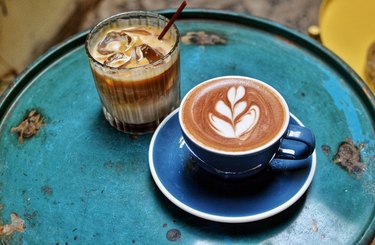
As it turns out, there's a link between coffee and throat irritation or tightness. Drinks and foods containing caffeine, such as coffee or chocolate, may cause throat tightness in those with gastrointestinal issues. Individuals who are allergic to caffeine may experience serious side effects.
Tip
If coffee or cola is causing throat tightness or irritation, a gastrointestinal issue, such as gastroesophageal reflux disease (GERD), could be the culprit. A caffeine allergy is a more serious cause of throat tightness, but this health condition isn't common.
Video of the Day
Caffeine and Throat Tightness
There are cases where caffeine causes throat tightness due to an allergic reaction. This type of allergy is rare, though. A January 2015 case report in Asia Pacific Allergy confirmed that individuals who are allergic to caffeine may experience an itchy throat and hives shortly after ingesting it. The symptoms can progress to anaphylaxis, which causes swelling of the throat or tongue and difficulty breathing.
Video of the Day
If caffeine causes throat tightness or difficulty breathing, this could be a serious and life-threatening matter. It is important to have your doctor perform a skin prick test to determine whether the caffeine or another ingredient is to blame.
You should also avoid caffeinated drinks and foods until you see a healthcare provider. A caffeine allergy is different than the side effects of ingesting too much caffeine, which may cause jitteriness or headaches, but not breathing problems.
One study is shedding more light on the cause of caffeine allergies by looking at coffee beans and how they are handled during roasting. A May 2017 study in the Journal of Toxicology and Environmental Health suggests that green coffee beans may contain mold, which can trigger allergic reactions.
Why Coffee Causes Throat Irritation
A more likely explanation for coffee causing throat irritation or tightness is that you have a gastrointestinal issue, such as gastroesophageal reflux disease (GERD). According to the Cleveland Clinic, drinking or eating certain substances, such as coffee, chocolate or citrus foods, may weaken the lower esophageal sphincter. As a result, it won't close properly, allowing the contents of the stomach to move up into the esophagus and affect your throat.
In addition to coffee causing a scratchy throat, other signs of GERD include persistent heartburn, hoarseness or pain in the chest. Ingesting caffeine can also give you the sensation of throat tightness, trouble swallowing, the feeling you have food stuck in your throat or even the sensation of choking.
If you suspect a gastrointestinal issue like GERD, see a doctor so you can get adequate treatment. You should also avoid certain foods and beverages, such as coffee, carbonated beverages, chocolate and alcohol, reports Harvard Medical School. Try switching to decaffeinated beverages, like chamomile tea, and stay upright for several hours after eating to help relieve the symptoms.
Should You Avoid Caffeine?
Unless caffeine is causing throat tightness or irritation, you can ingest it in moderate amounts without any negative side effects. According to the Mayo Clinic, healthy adults may consume up to 400 milligrams of caffeine a day — that's about four cups of coffee.
Since caffeine is a natural stimulant, it has some beneficial effects, such as increased alertness, says Harvard Medical School. Furthermore, it may protect against dementia and improve athletic endurance.
If you ingest too much caffeine, however, you may experience side effects. Headaches, insomnia, nervousness or an upset stomach are all common.
It is best to stick to caffeinated beverages and foods rich in antioxidants, such as coffee, green tea and dark chocolate rather than energy drinks (which provide about 91 milligrams of caffeine in an 8-ounce cup) or soda (49 milligrams in a 16-ounce bottle), says the USDA. If you're watching your caffeine intake, an 8-ounce cup of green tea has just 28 milligrams of caffeine versus regular coffee, which boasts 95 milligrams.
- Asia Pacific Allergy: "Anaphylaxis Due to Caffeine"
- Journal of Toxicology and Environmental Health: "Fungal Contamination in Green Coffee Beans Samples: A Public Health Concern"
- Cleveland Clinic: "Gerd or Acid Reflux or Heartburn Overview"
- Harvard Medical School: "9 Ways to Relieve Acid Reflux Without Medication"
- Mayo Clinic: "Caffeine: How Much Is Too Much?"
- Harvard Medical School:"The Buzz About Caffeine and Health"
- USDA: "Top 10 Foods and Drinks High In Caffeine"
- USDA: "Tea, Hot, Chamomile"
- Mayo Clinic: "Mold Allergy"
Was this article helpful?
150 Characters Max
0/150
Thank you for sharing!
Thank you for your feedback!